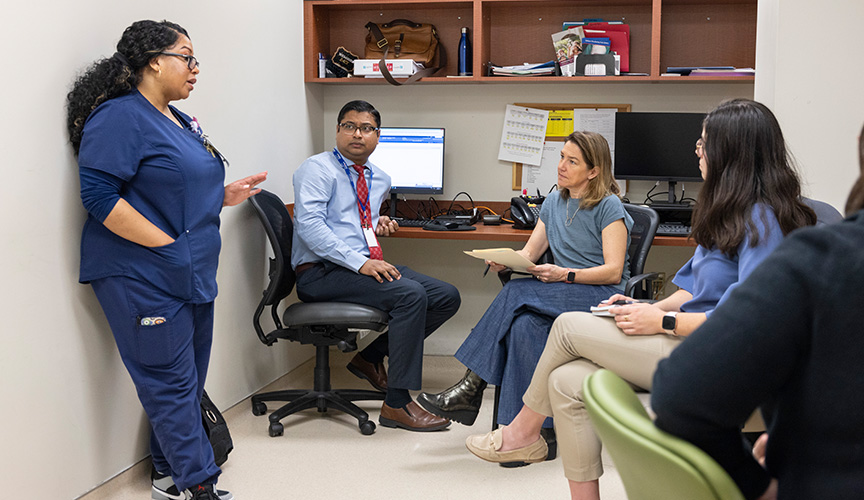Seizures or neurodevelopmental disorders (conditions that change how the brain functions) can sometimes be caused or influenced by genes. For children with a suspected or known genetic condition, Le Bonheur’s Neuroscience Institute offers a Neurogenetics Clinic for families and caregivers to learn more about how genetics might contribute to their seizures or neurodevelopmental disorder.
In the Neurogenetics Clinic, genetics and neurology providers work together to decide whether genetic tests may help diagnose and treat a child’s condition. Providers also interpret genetic test results and what they mean for the child and family. The multidisciplinary team provides up-to-date information about the diagnosis, best ways to manage or treat the disease, support resources or advocacy groups and any clinical trials or research opportunities that may be available and a good fit for the child.
The Neurogenetics Clinic aims to provide the most comprehensive care and understand the underlying cause for seizures. Providers review and combine neurological and developmental information, such as symptoms, seizures and brain imaging or testing, with genetic testing with the ultimate goal of improving seizures and other symptoms.

Why Le Bonheur’s Neurogenetics Clinic?
The Neurogenetics Clinic is one piece of the comprehensive care provided to children with neurologic conditions at Le Bonheur’s Neuroscience Institute. Our Comprehensive Epilepsy Program is accredited as a Level IV Center by the National Association of Epilepsy Centers (NAEC). Our program provides full services for children with epilepsy or other neurological conditions, including evaluation in a state-of-the-art Epilepsy Monitoring Unit (EMU), advanced testing and the most cutting-edge treatments available.
Le Bonheur also collaborates with St. Jude Children’s Research Hospital through the Pediatric Translational Neuroscience Initiative (PTNI). The PTNI aims to provide basic research, clinical trials and multispecialty care to more rapidly deliver new therapies to children living with genetic neurologic diseases. This partnership provides connections to research opportunities for children with genetic neurologic diseases seen in the Neurogenetics Clinic.

Conditions We See
The Neurogenetics Clinic sees children referred by a neurologist who suspects a genetic epilepsy or genetic neurodevelopmental condition. A few of those diagnoses may include:
- Developmental and epileptic encephalopathies (DEE), which are epilepsies that cause severe seizures, are difficult to treat and can significantly impact development
- Rare genetic epilepsies due to CHD2, SYNGAP1, SLC6A1, STXBP1, PCDH19, GNAI1, SCN2A, SCN8A, RHOBTB2, KCNQ2 and other genes
- Epilepsy without a known cause, but suspected to be genetic

What to Expect at Your First Appointment
Because of the extensive nature of the evaluations in our clinic and the multiple providers that you will see, plan for the first visit to clinic to last around two hours. You will meet with at least two or three different providers during your visit who put together a comprehensive plan unique to every child.
A genetic counselor will review family history, the child’s condition and any genetic testing they have already had. A geneticist specializing in epilepsy and neurodevelopmental conditions will then examine your child and obtain any additional medical history. Using this information, the geneticist can identify potential diagnoses and what genetic conditions might be at play. Finally, a neurologist with expertise in genetic neurologic conditions, will examine the patient to better understand what specific neurological issues the child is experiencing and recommend treatment options as appropriate.
At the end of the appointment all the providers will discuss the plan for your child with you, and you will have the opportunity to ask any questions or raise any concerns. During this time, you’ll learn more about the specific genetic condition your child has, what it means for the child and the family and what resources are available for that condition or symptoms. If genetic testing has not identified a specific genetic condition, our experts can recommend additional testing or research opportunities. The Neurogenetics Clinic providers will communicate and collaborate closely with each child’s referring neurologist, and the child will continue to see their referring neurologist for treatment and regular follow up visits.
Your child will follow up with the Neurogenetics Clinic team based on their needs. For some this may be every one to five years, and for others, regular follow up may not be needed or recommended. Follow up allows the providers to track your child’s symptoms and development. Information about and treatments for genetic neurologic conditions continue to grow and change rapidly. Your neurogenetics team will provide any updates on their condition, including treatments or new research opportunities.





